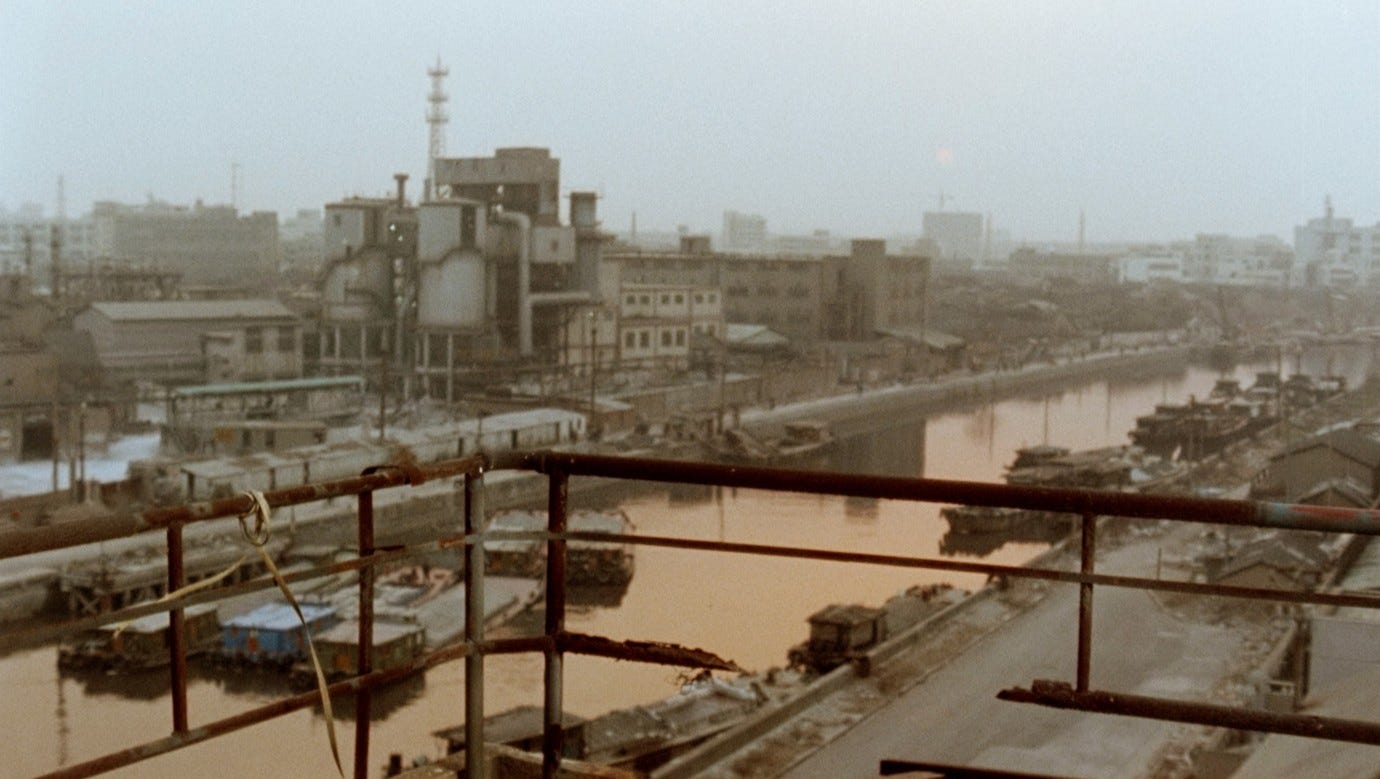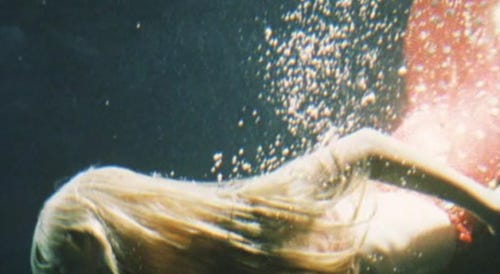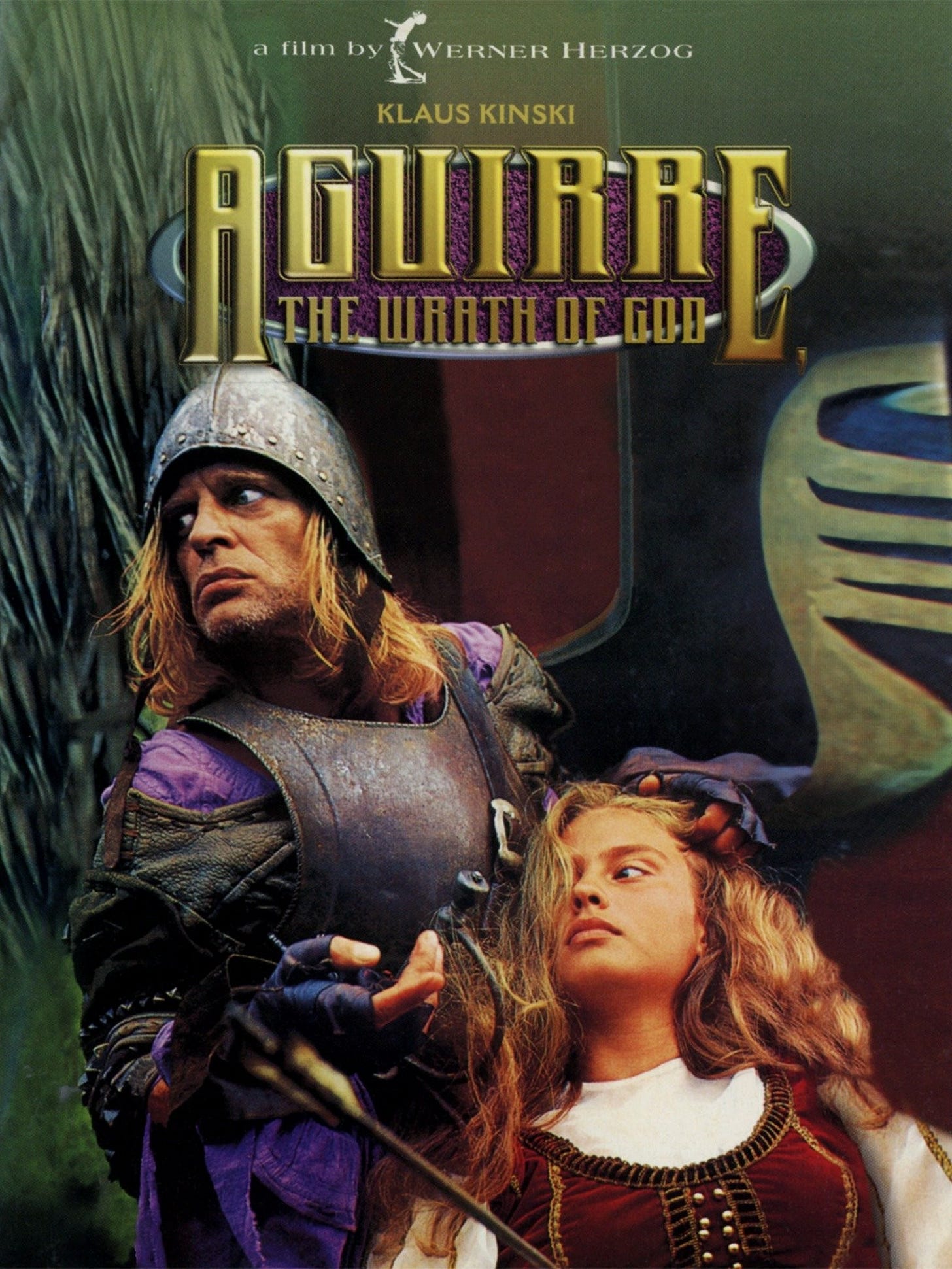Directed by Lou Ye
Germany & China, 2000
There’s a century worth of stories here and rubbish, which make it the filthiest river.
The Suzhou river flows through the centre of Shanghai. Heavily polluted by industrial waste, it has a Stygian atmosphere. The banks are lined by old factories, derelict warehouses, and anonymous tower blocks. Boats float up and down the river, ferrying people with no obvious destination in mind. The river demarcates a boundary, possibly between life and death.
These grainy images are captured by a ‘videographer’ in the opening sequence of this beguiling film by the director Lou Ye. Lou Ye came of age as a filmmaker in the 1990s, following the Tiananmen Square massacre, when the pressures of state censorship led to the rise of the Chinese Sixth Generation. This was an edgy, underground film movement that owed a lot to the French New Wave. The group focused on the cultural and aesthetic malaise that was a by-product of the economic boom of a newly globalised China – a boom that left swathes of people behind, living on the fringes of society.
What we are watching is a film within a film. The first plays out with a first-person perspective. It is the videographer himself, he remains anonymous and we never see his face, but it is his narration. One day his pager buzzes and he is hired by the owner of a seedy nightclub to film one of the dancers. Her name is Meimei (Zhou Xun) and her performance involves swim-dancing in a large aquarium, dressed as a blonde mermaid. The videographer falls for her, and they become lovers.
She is a woman of mystery, disappearing for days on end without explanation. One day she comes home and taunts the videographer with a question: if she were to vanish forever, would he spend his life searching for her? She then tells him the story of Mardar (Jia Hongsheng), a local bike courier, who fell in love with a girl and when she disappeared, presumed dead, he never gave up on his search for her. At this point the videographer takes up the tale, and the film switches to a third-person perspective.
Mardar was hired to drive the young daughter of a businessman around the city. Her name is Moudan, he falls for her, and they become lovers. It turns out that Mardar is a petty criminal and he gets involved in a plot to kidnap his new lover and extort a ransom from her father. When Moudan finds this out, she escapes, runs away, and throws herself into the river, grasping her doll – a mermaid. Her body is never discovered, but Mardar can’t believe she’s dead. Later, in the first of many twists he comes across Meimei and is convinced that she must be his missing Moudan.
If you’re thinking that the story sounds familiar – the romantic obsession, a woman in the river, the doubles – the reference to Alfred Hitchcock’s Vertigo is obvious. At one point the muted score actually echoes Bernard Herrmann’s haunting composition. A homage? Perhaps, although Lou Ye lacks Hitchcock’s cynical view of male-female relations. Suzhou River is a deeply romantic film and Lou Ye’s outlook has more in common with the humanism of a film we reviewed last year, Chungking Express.
Of course, we are reliant on the story as told by our narrator and he often veers into supposition: “he might have…”, “if he did…’. What can one expect from a film that is about filmmaking? Stretching irony to its breaking point, the videographer assures us that the camera doesn’t lie. The dreamlike fairytale quality of Suzhou River is added to by fleeting, ethereal shots of Meimei/Moudan sitting at the water’s edge, in the guise of a mermaid, her glistening red tail submersed in the darkness of the river.
The atmosphere is one of longing, passion, and regret, particularly as we move into the tragic final act. But with so much narrative trickery on show, the question remains: are we being had? The film plays like a series of video diaries, but who knows what was lost in the edit? Perhaps Lou Ye has more in common with Hitchcock than we think. In addition to Vertigo, Suzhou River bears a close resemblance to yet another film we reviewed last year, Edward Yang’s Taiwanese film, The Terrorizers. There we had another photographer who becomes obsessed by a woman, creating a fantasy to evade the mundane realities of life.
In this tale of mermaids, double crossings, and doppelgängers, we get to see the gritty, dirtier, industrial side of Shanghai, in contrast to the more commonly depicted glossy, luxurious, super-city: reality versus fantasy. Lou Ye’s film was banned in China on its release, and the director himself received a two-year ban from filmmaking.
We have lingered in the chambers of the sea
By sea-girls wreathed with seaweed red and brown
Till human voices wake us, and we drown.
― T.S. Eliot
Reids’ Results (out of 100)
C - 67
T - 79
N - 70
S - 67
Thank you for reading Reids on Film. If you enjoyed it please share with a friend and do leave a comment.
Coming next… Aguirre, the Wrath of God(1972)








Totally different from Disney little marmaid